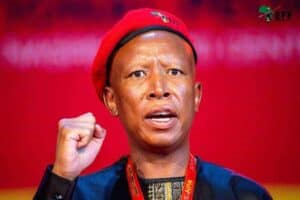If the South African Reserve Bank Amendment Bill is passed in parliament, there will be no more checks and balances.

Parliament wants to know what you think of Julius Malema’s Bill aimed at nationalising the South African Reserve Bank.
Malema tabled the South African Reserve Bank Amendment Bill in parliament in 2018 and published for comment at the end of May 2018. However, it lapsed at the end of the fifth parliament, but the National Assembly revived it in October 2019.
According to Cabinet, the Bill also lapsed at the end of the sixth parliament but was revived by the National Assembly in July 2024. In September last year, the standing committee on finance resolved to open the Bill to another round of public comment.
The South African Reserve Bank Amendment Bill seeks to establish the state as the sole shareholder of the Reserve Bank’s shares, while the minister of finance will exercise the rights attached to the shares in the bank the state owns.
ALSO READ: The ANC’s war about nationalising the Reserve Bank is pointless
Aims of the South African Reserve Bank Amendment Bill
The South African Reserve Bank Amendment Bill also aims to amend the South African Reserve Bank Act to:
- delete certain definitions;
- insert a definition;
- provide for the minister to appoint certain board directors;
- provide for the tenure of appointed directors;
- deal with the filling of casual vacancies for appointed directors;
- repeal certain sections of the Act;
- give the minister the power to appoint auditors of the Reserve Bank;
- give the minister the power to make regulations regarding the appointment of appointed directors; and
- provide for related matters.
ALSO READ: Why the Reserve Bank should not be nationalised
Free SA already had its say
The organisation Free SA already made a formal submission to parliament, expressing its strong opposition to the South African Reserve Bank Amendment Bill, warning that the proposed nationalisation of the central bank threatens the country’s economic stability, institutional independence and international credibility.
While the Amendment Bill does not alter the Reserve Bank’s constitutional mandate to protect the value of the rand, Free SA cautions that it will undermine the very independence that makes this mandate effective.
“An independent central bank is the cornerstone of any credible economic system. Handing full control of the Reserve Bank to political authorities opens the door to fiscal dominance, inflationary pressure and potentially disastrous economic mismanagement,” Reuben Coetzer, spokesperson of Free SA, says.
He points out that Free SA’s submission details the economic, legal, institutional and reputational risks of centralising the Reserve Bank’s governance in the executive.
Drawing on examples from Zimbabwe and Venezuela, he says the submission illustrates how loss of central bank independence historically led to hyperinflation, currency collapse and widespread poverty.
ALSO READ: The slow nationalisation of the South African Reserve Bank
Specific dangers in South African Reserve Bank Amendment Bill
The submission highlights these specific dangers in the South African Reserve Bank Amendment Bill:
- Inflation risk: politicised monetary policy could lead to the Reserve Bank financing government deficits, weakening the rand and driving up inflation;
- Governance concerns: transferring all shareholder powers to the minister of finance eliminates external oversight and invites politicisation of appointments;
- Legal ambiguity: while technically constitutional, the Bill may undermine the spirit of section 224 of the Constitution, which demands independence “without fear, favour or prejudice”;
- Investor flight: market confidence in South Africa’s monetary policy regime could erode, resulting in capital outflows and higher borrowing costs.
“Symbolic ownership should not come at the cost of real economic harm. The Reserve Bank is one of South Africa’s most respected institutions. Undermining its independence, whether deliberately or by accident, will hurt ordinary South Africans most, especially the poor who suffer first and worst from inflation.”
Coetzer says Free SA calls on all members of parliament to reject the Amendment Bill and to uphold the constitutional and economic safeguards that protect South Africa’s monetary integrity.
“Reform should focus on strengthening accountability and transparency within the Reserve Bank, not eroding the institutional checks that preserved macroeconomic stability through some of the country’s most turbulent years.”






